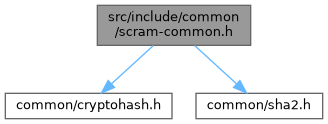

Go to the source code of this file.
Macros | |
| #define | SCRAM_SHA_256_NAME "SCRAM-SHA-256" |
| #define | SCRAM_SHA_256_PLUS_NAME "SCRAM-SHA-256-PLUS" /* with channel binding */ |
| #define | SCRAM_SHA_256_KEY_LEN PG_SHA256_DIGEST_LENGTH |
| #define | SCRAM_MAX_KEY_LEN SCRAM_SHA_256_KEY_LEN |
| #define | SCRAM_RAW_NONCE_LEN 18 |
| #define | SCRAM_DEFAULT_SALT_LEN 16 |
| #define | SCRAM_SHA_256_DEFAULT_ITERATIONS 4096 |
Functions | |
| int | scram_SaltedPassword (const char *password, pg_cryptohash_type hash_type, int key_length, const uint8 *salt, int saltlen, int iterations, uint8 *result, const char **errstr) |
| int | scram_H (const uint8 *input, pg_cryptohash_type hash_type, int key_length, uint8 *result, const char **errstr) |
| int | scram_ClientKey (const uint8 *salted_password, pg_cryptohash_type hash_type, int key_length, uint8 *result, const char **errstr) |
| int | scram_ServerKey (const uint8 *salted_password, pg_cryptohash_type hash_type, int key_length, uint8 *result, const char **errstr) |
| char * | scram_build_secret (pg_cryptohash_type hash_type, int key_length, const uint8 *salt, int saltlen, int iterations, const char *password, const char **errstr) |
Macro Definition Documentation
◆ SCRAM_DEFAULT_SALT_LEN
| #define SCRAM_DEFAULT_SALT_LEN 16 |
Definition at line 44 of file scram-common.h.
◆ SCRAM_MAX_KEY_LEN
| #define SCRAM_MAX_KEY_LEN SCRAM_SHA_256_KEY_LEN |
Definition at line 30 of file scram-common.h.
◆ SCRAM_RAW_NONCE_LEN
| #define SCRAM_RAW_NONCE_LEN 18 |
Definition at line 37 of file scram-common.h.
◆ SCRAM_SHA_256_DEFAULT_ITERATIONS
| #define SCRAM_SHA_256_DEFAULT_ITERATIONS 4096 |
Definition at line 50 of file scram-common.h.
◆ SCRAM_SHA_256_KEY_LEN
| #define SCRAM_SHA_256_KEY_LEN PG_SHA256_DIGEST_LENGTH |
Definition at line 24 of file scram-common.h.
◆ SCRAM_SHA_256_NAME
Definition at line 20 of file scram-common.h.
◆ SCRAM_SHA_256_PLUS_NAME
Definition at line 21 of file scram-common.h.
Function Documentation
◆ scram_build_secret()
|
extern |
Definition at line 209 of file scram-common.c.
References _, Assert, elog, ERROR, fb(), free, iterations, malloc, palloc(), password, pg_b64_enc_len(), pg_b64_encode(), PG_SHA256, scram_ClientKey(), scram_H(), SCRAM_MAX_KEY_LEN, scram_SaltedPassword(), scram_ServerKey(), and sprintf.
Referenced by pg_be_scram_build_secret(), and pg_fe_scram_build_secret().
◆ scram_ClientKey()
|
extern |
Definition at line 142 of file scram-common.c.
References fb(), pg_hmac_create(), pg_hmac_error(), pg_hmac_final(), pg_hmac_free(), pg_hmac_init(), and pg_hmac_update().
Referenced by calculate_client_proof(), and scram_build_secret().
◆ scram_H()
|
extern |
Definition at line 112 of file scram-common.c.
References fb(), input, pg_cryptohash_create(), pg_cryptohash_error(), pg_cryptohash_final(), pg_cryptohash_free(), pg_cryptohash_init(), and pg_cryptohash_update().
Referenced by calculate_client_proof(), scram_build_secret(), and verify_client_proof().
◆ scram_SaltedPassword()
|
extern |
Definition at line 38 of file scram-common.c.
References CHECK_FOR_INTERRUPTS, fb(), i, iterations, j, password, pg_hmac_create(), pg_hmac_error(), pg_hmac_final(), pg_hmac_free(), pg_hmac_init(), pg_hmac_update(), pg_hton32, and SCRAM_MAX_KEY_LEN.
Referenced by calculate_client_proof(), scram_build_secret(), and scram_verify_plain_password().
◆ scram_ServerKey()
|
extern |
Definition at line 172 of file scram-common.c.
References fb(), pg_hmac_create(), pg_hmac_error(), pg_hmac_final(), pg_hmac_free(), pg_hmac_init(), and pg_hmac_update().
Referenced by scram_build_secret(), scram_verify_plain_password(), and verify_server_signature().